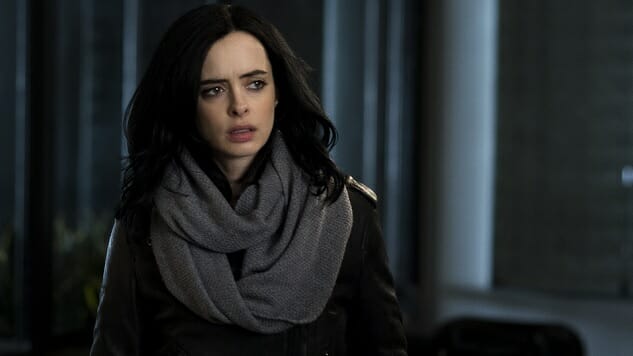Jessica Jones: “AKA It’s Called Whiskey”
(Episode 1.03)

Superheroes invite metaphors for discrimination by their very nature. People fear what they don’t understand; this is especially true when the “what” happens to be a giant green monster or a Norse god, but what Jessica Jones and Luke Cage lack in enormity or mythology they make up for with power. In “AKA Crush Syndrome,” these two got to see each other for what they are. In “AKA It’s Called Whiskey,” they’re curing their self-imposed isolation from emotional contact with supersex—lots of it, followed by a dialogue about what it’s like being “gifted.” Their talk is the first time in Jessica Jones that meaningful reference has been made to The Avengers, and the nod strikes a sharp contrast between them and their better-known peers.
Other Marvel shows, particularly Agents of S.H.I.E.L.D., suggest that their casts of characters live explicitly in the shadows of Marvel films. In Jessica Jones, they’re living off to the side of those shadows. Neither Jessica nor Luke seem to have much use for the tragedy of the New York incident, or for the exploits and adventures of Tony Stark, Thor, Captain America, and Black Widow. If anything, having those heroes saving the world out in the open makes life just a mite more overloaded for everyone else. “People find out,” Luke murmurs to Jessica over dinner, “They either come at you with a noose or their hands out.” If you knew your neighbor could lift a car over their head, what would you do? Would you suddenly fear them? Would you see them as a threat to your safety? Would you ask them to help you renovate your den in time for the holidays?
-

-

-

-

-

-

-

-

-

-

-

-

-

-

-

-

-

-

-

-

-

-

-

-

-

-

-

-

-

-

-

-

-

-

-

-

-

-

-

-








































